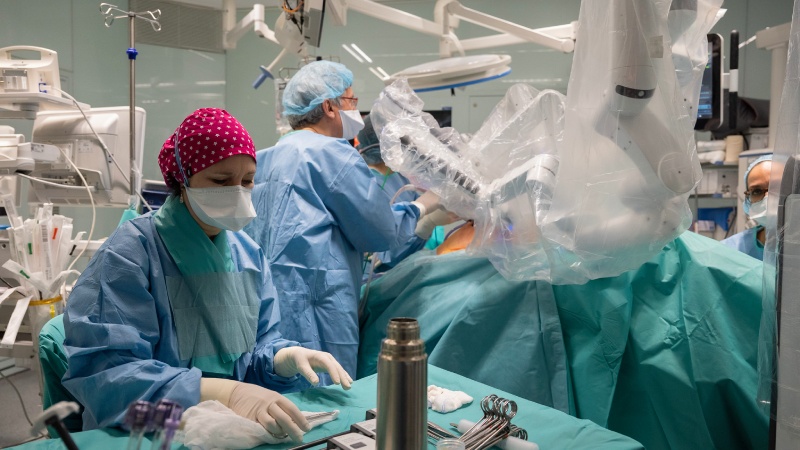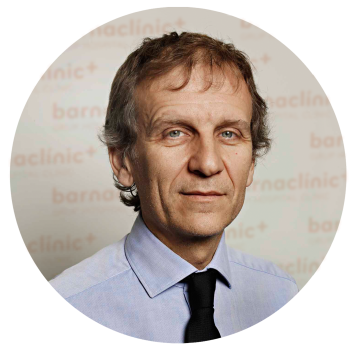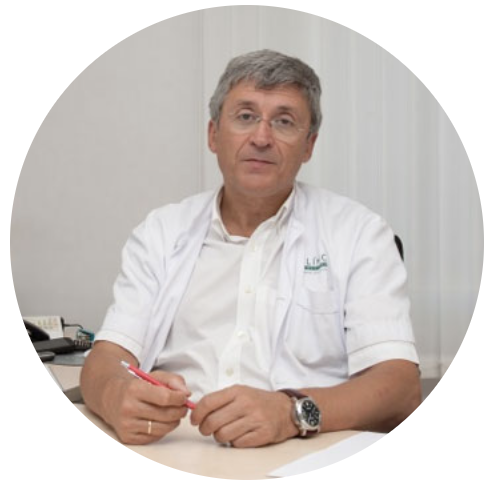21 July, 2022
The Hospital Clínic performs the second uterus transplant in Spain

A year and a half after performing the first uterus transplant in Spain, the Hospital Clínic performed this operation again last April. A mother donated her uterus so that her daughter could become pregnant in an intervention led by Dr Francisco Carmona, head of the Hospital Clínic Gynaecology Service and barnaclínic+ gynaecological surgeon, and Dr Antonio Alcaraz, head of the Service of Urology and Kidney Transplantation at Hospital Clínic and urological and transplant surgeon at barnaclínic+.
The operation, which lasted 18 hours, proceeded normally and two months later the patient had her first menstruation. Now it is expected that at the end of this year the first embryo can be implanted. “What will determine that this entire operation has been a success will be that the woman gives birth. We are in a very ambitious and exciting project, in which we are advancing adequately. But we have not yet reached the goal”, explains Dr Francisco Carmona.
IN MAY INTEREST YOU…
· Hospital Clínic performs the first uterus transplant in Spain
UTERUS TRANSPLANTATION, A GREATLY COMPLEX SURGERY
The uterus is a very complex organ, with a network of small, fragile veins rather than well-established, visible veins, as in other organs. When there is no pregnancy, it is very poorly vascularised and here lies part of the complexity of this surgery. “A total of seven surgeons have been working and there are different peaks of complexity during the intervention where the viability of the organ depends on everyone being absolutely focused”, explains Dr Antonio Alcaraz, who adds that “we are probably talking about the most complex transplant that is undertaken, only comparable to a face transplant. With the difference that in the latter a partial success is possible, while in the uterus it either goes well or it goes wrong, there is no middle ground”.
“The uterus transplant is probably the most complex that is undertaken, only comparable to the face transplant. With the difference that in the latter a partial success is possible, while in the uterus it either goes well or it goes wrong, there is no middle ground”
Dr Antonio Alcaraz, Head of the Urology and Kidney Transplant Service at Hospital Clínic and urological and transplant surgeon at barnaclínic+
For Dr Francisco Carmona, the most transcendental moment of the operation is just before extracting the organ from the donor, when it has already separated from the structures that keep it fixed in her anatomy. “At this moment when the uterus is only joined by the veins and arteries that we are going to preserve and we open the vagina to extract it, it is a particularly complicated moment. At that moment it is extremely easy to make a mistake that damages the vascularization and we lose the organ”.
“The moment when the uterus is only joined by the veins and arteries that we are going to keep and we open the vagina to extract it is a particularly complicated moment”
Dr Francisco Carmona, Head of the Gynaecology Service at Hospital Clínic and gynaecological surgeon at barnaclínic+
CHANGES IN THE PROCEDURE REGARDING THE FIRST UTERUS TRANSPLANT IN SPAIN
Although barely a year and a half have passed since the first uterus transplant in Spain, carried out by the same team, for this new intervention they have introduced some modifications. One of them has had to do with the possibility of having an exoscope this time, a device incorporated into the hospital a few months ago and which consists of a high-magnification lens and high image definition.
Some procedures have also been modified, such as the number of viable embryos that will be available. In the first uterus transplant, four healthy embryos were available, but this time 16 have been achieved, which increases the chances of pregnancy on this second occasion.
MOTHER TO DAUGHTER UTERUS TRANSPLANTATION
If in the case of the first transplant there were two sisters, this time the donor was a mother with the desire to see how her daughter had a child of her own. “I have always wanted her to be a mother. Every time I saw my other daughter with her son, I was always sad that she couldn’t be a mother. We had first thought that it would be her sister who would donate her uterus, but I said no, that she was still very young”, explains Marilen González.
“On May 22 I had my first period and it was something shocking. In theory, after six months the first embryo transfer will take place and we hope that everything goes well”, adds Maira Montes, the recipient of the transplant.
Dr Antonio Alcaraz highlights the importance that power can have for some women when they become mothers, a feeling that must be understood and respected. “It is true that the uterus is not a vital organ, that one can live without being a mother. But it is also true that there are even suicides among women who cannot have children because it is unbearable for them”.
“It is true that the uterus is not a vital organ, that one can live without being a mother. But it is also true that there are even suicides among women who cannot have children because it is unbearable for them”
SURGERY OF THE HIGHEST LEVEL
Currently, around 100 uterus transplants have been performed worldwide and their viability is around 80%. 30 children have already been born to date. In general, you wait about 6 months after the operation to transfer an embryo and women usually get pregnant between the fourth and fifth transfer. With this type of transplant there are 40% of viable healthy newborns, while with the standard in vitro fertilization, the rate of viable newborns per couple that starts the process does not reach 20%.
TE PUEDE INTERESAR…
· In vitro fertilisation
Dr Francisco Carmona highlights the success of Hospital Clínic having been able to perform these transplants, which places it among the world’s surgical elite. “The difficulty of the transplant is very important. Not only the technical difficulty of the surgery. The Hospital Clínic has shown that it is capable of organizing a team and carrying out an intervention that only eight or ten teams in the world have ever carried out”.
“The difficulty of the transplant is very important. Not only the technical difficulty of the surgery. The Hospital Clínic has shown that it is capable of organizing a team and carrying out an intervention that only eight or ten teams in the world have ever carried out”
AN AMBITIOUS RESEARCH PROJECT
This operation, part of a research project that began five years ago, aims to validate the viability of this surgery by performing five transplants in women with Rokitansky syndrome throughout the project. This syndrome is a congenital defect in the female reproductive system, women who have it are born without a uterus or fallopian tubes.
The project involves a team made up of more than 50 professionals, and of these, 20 were the ones who carried out the operation, including specialists in urological and gynaecological surgery, anaesthesia and nursing staff. This demonstrates the hospital’s ability to organise a multidisciplinary team, whose coordination represents an important step in guaranteeing success.
Not only is a cohesive team necessary, but also highly specialised surgeons with the ability to transplant an organ such as the uterus, which may allow other transplants to be carried out in women who have had this organ removed or who do not have a functional uterus. Carrying out this uterus transplant at Hospital Clínic constitutes technological progress that paves the way for carrying out other transplants, such as kidney or other organ transplants in very low birth weight children with vessels very similar to those found in the uterus.
DO YOU WANT TO CONTACT THE TEAM OF DR. FRANCISCO CARMONA?
DO YOU WANT TO CONTACT THE TEAM OF DR. ANTONIO ALCARAZ?
Photo: Francisco Avia | Hospital Clínic de Barcelona



